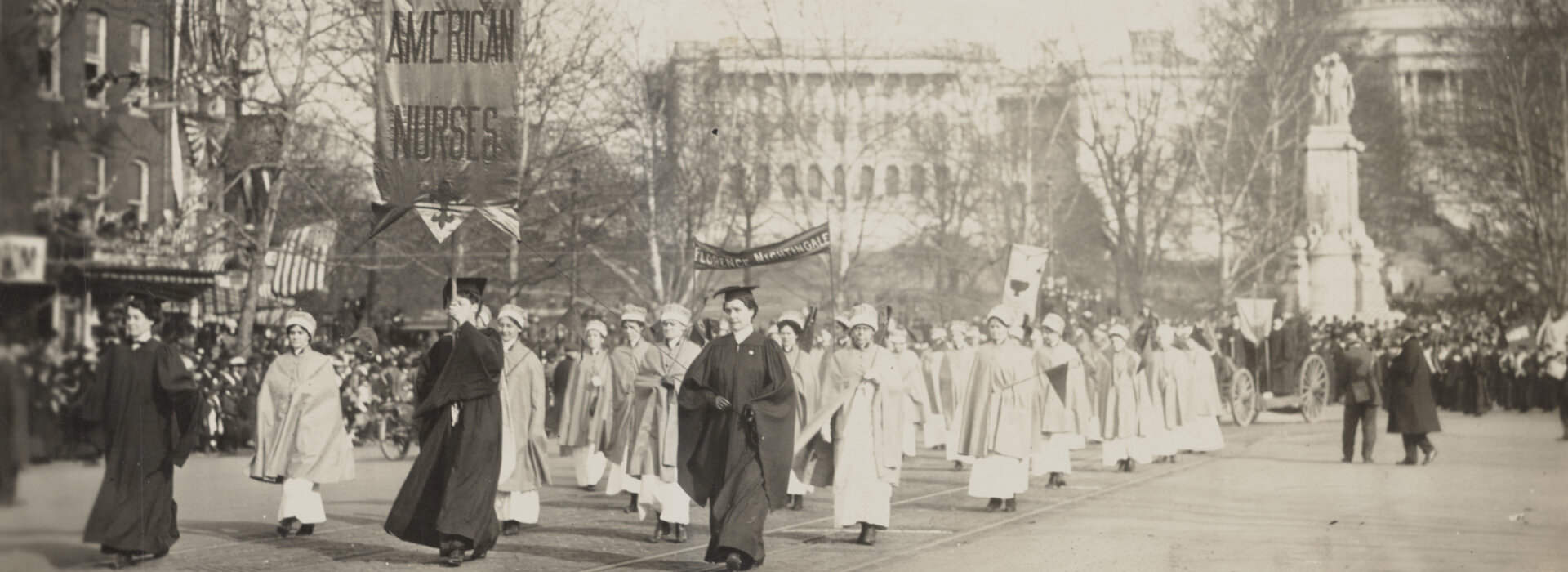In Pursuit of Knowledge and Justice: The Shared Growth of the Nursing Profession and the Suffrage Movement
Image via the Library of Congress
Understanding the evolution of women’s empowerment from the Civil War through the passage of the 19th amendment
This article is part of our “The Power of Nursing” series, celebrating the Year of the Nurse by sharing the stories of influential nurses throughout modern history.
This year marks the 100th anniversary of the addition of the 19th amendment to the United States Constitution, granting women the right to vote.
Approved by the House of Representatives in 1919 and fully ratified in 1920, the fight for women’s suffrage was long and hard fought. Beginning with the 1848 women’s rights convention in Seneca Falls, it took 72 years to see women’s right to vote written into law.
There are many prominent suffragettes who are credited with leading the movement, but it was the work of everyday women that made it successful. By the mid-19th century, more and more women began to look beyond social expectations. Many took on prominent roles in the workforce, including critical nursing roles during the Civil War and the First World War. Nursing was one way that women served on the frontlines of their communities and the country overall.
In taking on new roles outside the home, many women began to see opportunities to further develop themselves and contribute to society. New experiences and ambitions inspired many women to advocate for additional rights.
Nurses in particular were in a powerful position to influence the suffrage movement because they were on the front lines both locally and at war, and therefore had direct exposure to the social, economic, and political issues that many physicians and politicians did not.
Their dedication to the greater good was a driving force behind the suffrage movement. In this article we explore the mutual growth of the women’s suffrage movement and the nursing profession.
Serving Communities, Serving the Greater Good
It wasn’t long after the Seneca Falls Convention that the Civil War began, and with it came a great need for nurses to care for wounded soldiers. Wars in Europe had already seen women working in war hospitals across the continent, including Florence Nightingale’s leadership during the Crimean War. Her published works inspired many women in the U.S. to volunteer as nurses during the Civil War.
Nursing provided women with a professional opportunity far greater than any they had previously experienced. Not only was their work critical to society, but it empowered them with complex scientific knowledge that enriched their intellectual lives and fostered meaningful professional ambitions. Hospitals in the late 19th century provided opportunities for nurses to be subject matter experts and to apply their specialized knowledge and training in impactful ways.
More broadly, the growth of the nursing profession allowed women to challenge social norms and cultural expectations that positioned women as domestic and deferential. In caring for challenging patients — predominantly men — nurses regularly asserted their knowledge and value.
Soon these shifts in identity and gender dynamics found a new forum: the growing suffrage movement in the United States.
The Perspective and Experiences of Nurses in the Growing Suffrage Movement
The work of nurses was not limited to hospitals. By the turn of the century, there were many nurses working in the community, caring for patients in their homes who were unable or unwilling to seek hospital care. These women saw firsthand the poor living conditions of the working class and knew that nursing alone was not enough to support public health.
In the early 20th century, many nurses became advocates for issues such as public sanitation, workers’ rights, public health, and social issues. Armed with knowledge and experience, they were not afraid to be seen and heard.
When it came to the suffrage movement, some nurses were openly involved — organizing demonstrations, marching in parades, canvassing within their communities. For others nurses, involvement in the women’s suffrage movement was more complicated. They were concerned that political involvement would compromise their ability to provide impartial expertise and service.
These varying perspectives were reflected in the professional organizations formed within the nursing field, each with its own vision and goals. Nurses had deep experience and informed opinions, and exercised their ability to affiliate with nursing organizations whose vision they supported.
Lasting Legacy
This evolution within the nursing field occurred in tandem with the suffrage movement, which gave women a larger platform to contribute to greater sociopolitical issues. When given the means to share their expertise and experience on a greater scale, nurses would have more power to make the kinds of changes that would improve public health. It was their experience as nurses that inspired many women to fight for more equal rights and recognition for their valuable contributions to their families, communities, and country.
The Foundation gratefully acknowledges the consultation provided by Drs. Cynthia Connolly and Patricia D’Antonio of the Barbara Bates Center for the Study of the History of Nursing. This article draws from resources made available to the public courtesy of the University of Pennsylvania.

